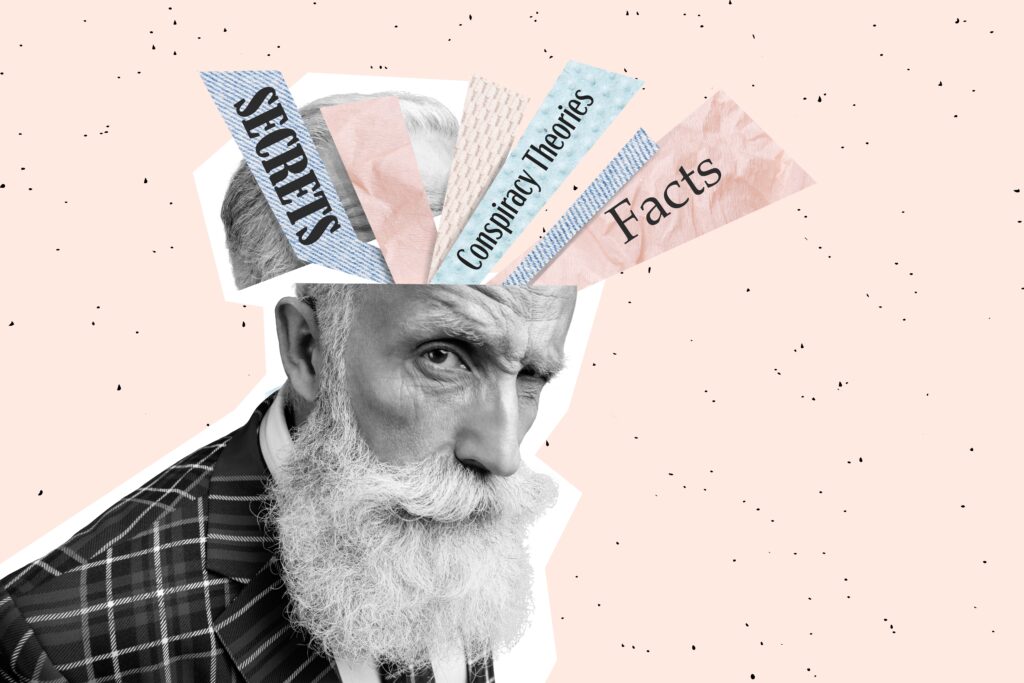Misinformation is everywhere, but Boomers seem especially susceptible to conspiracy theories.

Conspiracy theories aren’t new, but they’ve never spread as quickly or as widely as they do today. While people of all ages fall for misinformation, Boomers—many of whom grew up in an era of trusted news sources and tight-knit communities—seem particularly vulnerable.
Whether it’s political conspiracies, medical misinformation, or wild claims about global events, a growing number of older adults are embracing ideas that have little basis in reality.
Let’s take a deeper look at the reasons so many Boomers are latching on to conspiracy theories—and why it’s so hard to bring them back to reality.
1. They grew up trusting authority, and now they feel betrayed.

Boomers were raised in a time when institutions like the government, media, and science were widely trusted. But as they’ve aged, they’ve watched scandal after scandal unfold—Watergate, Vietnam, financial crises, and corporate corruption. Many now feel deceived by the very institutions they once relied on.
This sense of betrayal makes them more likely to believe alternative explanations, even when those explanations are far-fetched. If the mainstream narrative has failed them before, why should they trust it now?
2. They didn’t grow up with the internet and aren’t as skilled at spotting misinformation.

Younger generations, who were raised in the digital age, have been trained to question online content, fact-check sources, and recognize clickbait. Boomers, however, didn’t grow up navigating an internet filled with falsehoods, deepfakes, and propaganda.
They’re more likely to take things at face value, assuming that if something looks professional or comes from a seemingly legitimate source, it must be true. Without the same level of digital literacy, they often struggle to distinguish fact from fiction.
3. Social media algorithms keep feeding them the same misinformation.

Boomers may have started out skeptical of a conspiracy theory, but once they engage with a single post, the algorithm takes over. Platforms like Facebook and YouTube are designed to push content that keeps people engaged, which often means serving up more extreme versions of what they’ve already seen.
If a Boomer watches one video questioning a political event, their feed quickly fills with similar—and often more extreme—videos reinforcing the same ideas. Over time, this creates an echo chamber where misinformation feels like the absolute truth.
4. They have more time to consume media but fewer sources they trust.

Many Boomers are retired or working fewer hours, giving them more time to watch TV, scroll social media, and engage with online content. But as traditional journalism has declined, the number of reputable news sources they trust has also shrunk.
Some turn to partisan networks that reinforce their beliefs, while others dive into independent “news” sites that often prioritize sensationalism over truth. With more time to consume information but fewer trustworthy sources, many Boomers end up in a cycle of misinformation.
5. Fear and uncertainty make conspiracy theories more appealing.

The world is changing fast—technology, culture, politics, and global events are evolving in ways that can feel overwhelming. Many Boomers feel disconnected from these changes and anxious about the future. Conspiracy theories offer simple, comforting explanations for complex problems.
Rather than accepting that the world is unpredictable and messy, they latch onto narratives that provide clear villains and heroes. In times of fear, a false sense of control—even through misinformation—feels better than uncertainty.
6. They belong to tight-knit communities where misinformation spreads easily.

Church groups, veterans’ organizations, and social clubs have long been pillars of Boomer culture. But these same close-knit communities can become echo chambers where misinformation spreads unchecked.
When a trusted friend, family member, or pastor shares a conspiracy theory, it carries more weight than a fact-check from an unfamiliar source. Many Boomers are more likely to believe information that comes from within their social circles, even if it’s completely false.
7. They don’t want to admit they’ve been misled.

No one likes to admit they were wrong, but for Boomers who have fully embraced conspiracy theories, backing down feels impossible. They may have argued with family members, reshaped their political views, or even lost friendships over their beliefs.
To admit they were fooled would mean acknowledging they were manipulated—something that’s deeply uncomfortable for anyone. Instead of reevaluating, many double down, clinging even tighter to the false narratives they’ve built their worldview around.
8. Nostalgia makes them resistant to new realities.

Boomers often long for the world they grew up in—a time when things felt simpler, safer, and more predictable. Conspiracy theories play into this nostalgia by painting the present as corrupt and dangerous while positioning the past as a golden age. Many of these theories reinforce the idea that things have gone wrong because of specific groups, policies, or cultural changes.
This mindset makes them more susceptible to misleading narratives that promise a return to the “good old days” if only certain forces can be defeated.
9. They see themselves as “free thinkers” who are questioning the narrative.

Once someone falls into conspiracy thinking, they often start seeing themselves as more enlightened than the masses. Boomers who embrace misinformation may believe they are the only ones brave enough to question the official story. This sense of intellectual superiority makes it even harder to convince them otherwise.
Rather than trusting experts, they begin to view independent bloggers, YouTubers, and social media influencers as the real truth-tellers. The more the mainstream media debunks their beliefs, the more convinced they become that they’re onto something.
10. Political polarization has made conspiracy theories more appealing.

In today’s divided world, conspiracy theories aren’t just fringe ideas—they’ve become deeply tied to political identities. Many Boomers have watched their preferred political party or values change dramatically over the years, leaving them feeling disillusioned.
Conspiracy theories often validate their frustrations by suggesting that powerful elites, corrupt politicians, or secret organizations are manipulating society. These narratives turn political disagreements into battles of good versus evil, making it easier for Boomers to justify extreme beliefs.
11. They aren’t being challenged enough by people they trust.

Many Boomers who believe conspiracy theories surround themselves with like-minded individuals. Whether it’s through online communities, talk radio, or partisan news, they rarely hear opposing viewpoints. When family members try to challenge their beliefs, it often leads to defensiveness or even estrangement.
To truly break free from misinformation, Boomers need thoughtful, non-confrontational discussions with people they trust. But without that exposure, they continue reinforcing their own beliefs in an endless cycle.
